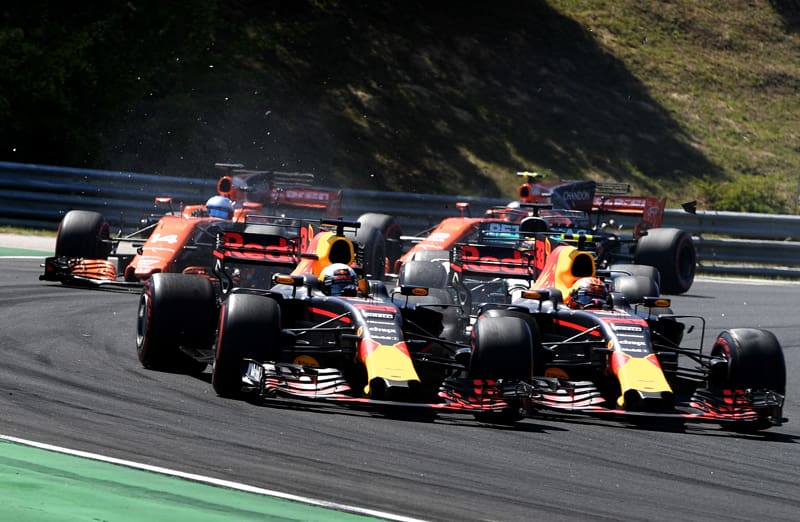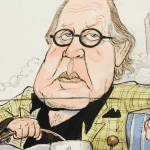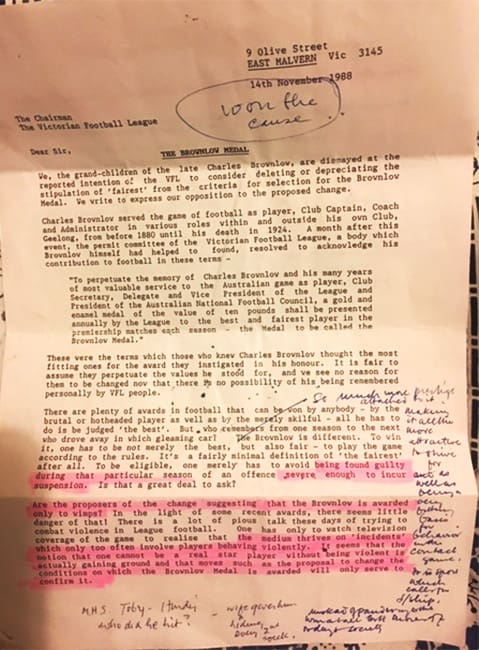WITH high speeds and high stakes, some Grand Prix drivers steer a very dodgy course. PETER COSTER looks at the aftermath of Daniel Ricciardo’s controversial crash in Hungary and similar stacks from the past:
THE TWISTING Hungaroring circuit near Budapest is like racing on the streets of Monaco without the bling and the buzz and Daniel Ricciardo must have thought he was back in the fairytale principality as Formula 1 went into the European summer break.
You wouldn’t have got a bet on him at the famous casino at Monte Carlo last year when his Red Bull team called him in without having his tyres ready and he lost the race to a fast-finishing Lewis Hamilton.
At the circuit near Budapest, Ricciardo was dominant in practice but then the gremlins started their mischief with the Red Bull Renault. Changes were made to the Australian driver’s car that saw him slip back to the third row of the grid alongside teammate Max Verstappen, behind the two Mercedes and the Ferraris on the front row.
Verstappen is 19 and given to impetuosity, which is a polite way of saying he’s sometimes crazy-brave, or just crazy.
There are laws of physics that sometimes determine what the car will do in spite of what the driver thinks he can do.
Verstappen and Ricciardo had overtaken Lewis Hamilton in his Mercedes and Ricciardo had passed Verstappen when they went into Turn Two. The Dutch teenager then had a rush of his already boiling blood when he attempted to repass Ricciardo.
The Red Bull locked up under braking and under-steered into the side of Ricciardo, who radioed that he had been hit — and was it who he thought it was — puncturing a tyre and wrecking a radiator, causing him to spin and retire.
The normally placid Ricciardo was hotter than Verstappen’s burning brakes. “It wasn’t on, and it was amateur, to say the least,” said the fuming Ricciardo. “He doesn’t like it when a teammate gets in front of him. It was a very poor mistake.”
There was further fury. “It’s like he tried the outside in Turn One. it didn’t work out and he had the line taken from him. Then I go past and it’s, ‘Oops, I’ve go to fix it.'”

Verstappen apologised, but the consequences became obvious. The Red Bull cars, which have been down on top-end speed behind the Ferraris and the Mercedes were well suited to the twisting Hungaroring. Ricciardo’s car had shown that before changes were made that cost him what could have been pole. That had been rectified by the time the race started.
Verstappen’s race pace was confirmed when he was given a 10-second pit stop penalty but wiped it off by the end of the race.
Ricciardo could be forgiven for thinking that just as he should have won at Monaco last year, he had been cheated of possible victory in Hungary.
Verstappen’s slide into Ricciardo had the same effect as the crash that cost Mark Webber the chance of taking out the 2010 world championship. Sebastian Vettel, who won on Sunday in Hungary for Ferrari, drove into the side of Webber’s Red Bull. Like Ricciardo and Verstappen, they were teammates.
What happened in Turkey was a rerun of what happened to British driver Damon Hill in Adelaide in the last race of the 1994 season. Hill a week earlier had snatched victory from Schumacher at the Japanese GP in Sizuka. They were separated by a point as the teams arrived in Adelaide. Schumacher lost control but drove back across the track and into Hill’s Williams as Hill was passing. Schumacher was out of the race, but so was Hill when he pulled into the pits, unable to continue.
Schumacher won the world championship, but it was how he did it that displayed the ruthlessness that Vettel showed against Webber in the 2010 Turkish GP.
At the press conference after the Adelaide race, I asked Schumacher if he could have done anything to prevent his Benneton crashing into Hill. “No”, said, Schumacher, “the car was out of control.”
On reflection, it was the wrong question. No one followed it up, although there was general agreement later that the German crashed into Hill deliberately.
What I should have asked Schumacher was his response to the observation by Australian triple-world champion Sir Jack Brabham, but I only got Brabham’s quote after the race was long over. “He did the only thing he could have done,” Brabham told me.
“Black Jack” was as hard as they come. He finished the 1959 United States Grand Prix pushing his Cooper over the line after he ran out of petrol 300 yards from the finish.
He had enough points to have won his first world championship, but you got paid for finishing and Brabham said, “I wanted the lolly.”
But he wouldn’t have done what Schumacher did, which tainted the German’s first of seven world championships.
Vettel did it to Webber in Turkey in 2010 and Verstappen might not have been trying to crash Ricciardo out of the race in Hungary on Sunday, but it had the same effect. As the new Mercedes commercial says, “Time to grow up.”
PETER COSTER is a former editor and foreign correspondent who has covered a range of international sports, including world championship fights and the Olympic Games.




Discussion about this post